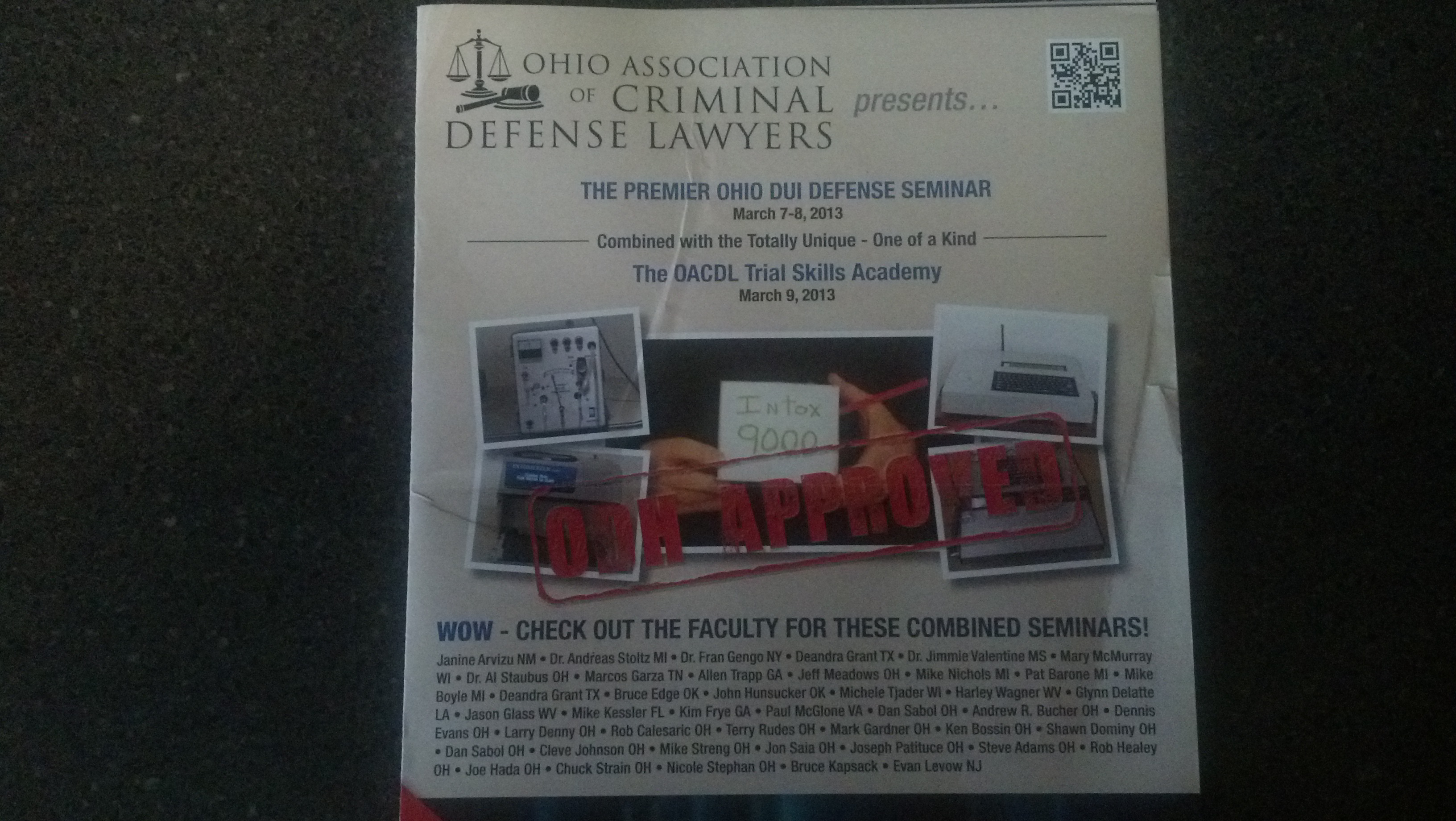 Last week was the annual DUI/OVI seminar hosted by the Ohio Association of Criminal Defense Lawyers (OACDL). The three-day seminar, held at the Westin in downtown Columbus, has become nationally recognized and is one of the few state seminars approved for credit from the National College for DUI Defense (NCDD). The theme of this year’s seminar was ‘what you need to know if you handle DUI/OVI cases’. There is a lot a lawyer needs to know, so the conference did not deal with substantive law: cases, statutes, and regulations. Instead, outstanding lawyers and experts from across the country taught about science, litigation, and presentation.
Last week was the annual DUI/OVI seminar hosted by the Ohio Association of Criminal Defense Lawyers (OACDL). The three-day seminar, held at the Westin in downtown Columbus, has become nationally recognized and is one of the few state seminars approved for credit from the National College for DUI Defense (NCDD). The theme of this year’s seminar was ‘what you need to know if you handle DUI/OVI cases’. There is a lot a lawyer needs to know, so the conference did not deal with substantive law: cases, statutes, and regulations. Instead, outstanding lawyers and experts from across the country taught about science, litigation, and presentation.
On Thursday, the seminar focused on the science involved in DUI/OVI cases. Jim Nesci (AZ) outlined what lawyers and judges need to know about breath testing. His presentation was followed by Al Staubus (OH) discussing the Intoxilyzer 8000 breath-testing machine and Chuck Rathburn (IN) discussing the Datamaster breath-testing machine. Cleve Johnson (OH) gave a thought-provoking lecture about the science behind decision-making. There were also presentations about blood testing (Justin McShane, PA) and forensic laboratories (Ron Moore, CA), as well as field sobriety testing and drug recognition evaluations (Tony Corroto, GA). For the first time, the conference on Thursday included a Q&A session between a panel of judges and the presenters/experts.
On Friday, the seminar focused on litigation in DUI/OVI cases. John Saia (OH) gave a presentation about the legal framework for DUI/OVI trials, and Tim Huey (OH) presented on trials with breath tests. I spoke about the Lancaster case in Marietta: the case in which the judge excluded the Intoxilyzer 8000 because we proved it is unreliable. The Intoxilzer 8000 and the Lancaster case have been the subject of previous posts in this blog (does that make me a one-trick pony?). Joe St. Louis (AZ) and Kim Frye (GA) demonstrated first-person opening statements, and Jay Ruane (CT) discussed timing and graphics in closing arguments. Justin McShane (PA) showed how he cross-examines expert witnesses, and Deandra Grant (TX) did jury selection with ‘team innocent’. Jury selection was also the topic for Joe Low (CA), which transitioned to the next day’s Trial Skills Academy.
Joe Low made the Trial Skills Academy memorable. Joe recounted the story of when Michelangelo was asked how he was able to make incredible sculptures like ‘David’. The artist responded by saying the sculpture was already there, and he just removed the debris. Joe did the same with the participants of the workshop, removing the debris to uncover talented trial lawyers. It is clear why Joe is a senior instructor and board member of the Trial Lawyers College.
Although I was an instructor at the Trial Skills Academy and a presenter at the seminar, I learned much more than I taught. I feel that way at the end of this seminar every year. I’ve been practicing for about 17 years, and good seminars remind me I don’t know everything there is to know. Maybe I’m a slow learner, or maybe I just need one more seminar.
 Columbus OVI/DUI Attorney Blog
Columbus OVI/DUI Attorney Blog

